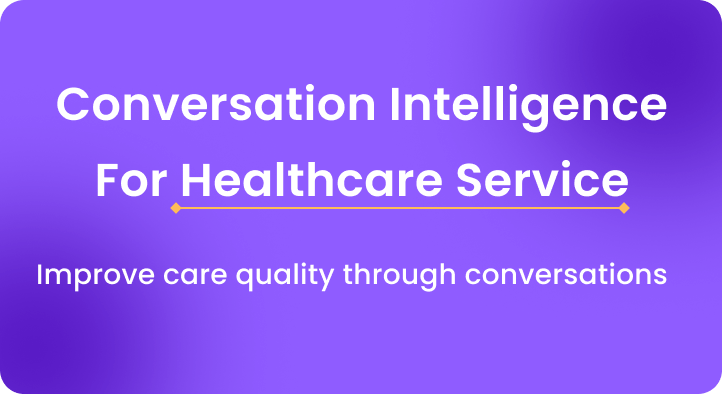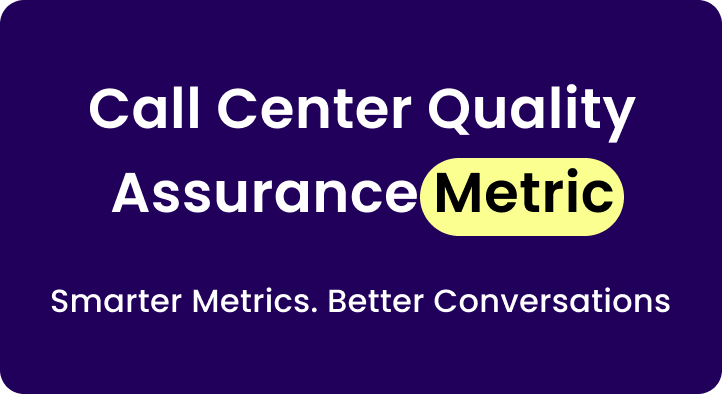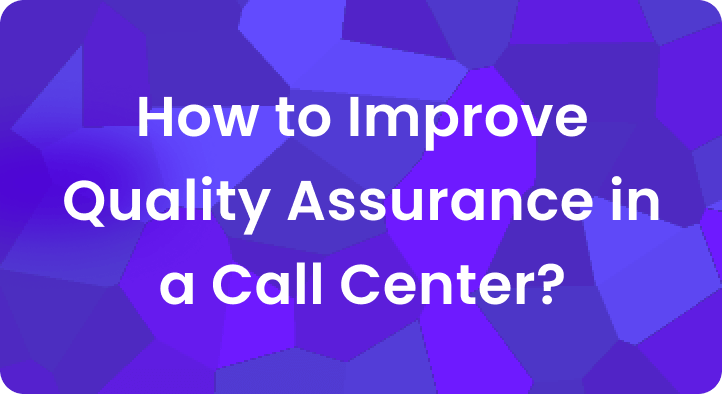Call center quality assurance (QA) used to be a manual, time-consuming job. Supervisors listened to a handful of calls, scored them, and hoped they caught the most important issues.
But let’s be honest: when you’re only reviewing 2% of conversations, you’re flying blind 98% of the time.
That’s where AI comes in. Today, artificial intelligence is transforming call center QA – automating the heavy lifting, catching what humans miss, and giving managers the insights they need to coach better and act faster.
Let’s break down how AI is changing the game for quality assurance in contact centers.
1. From 2% Sampling to 100% Call Coverage
In traditional QA setups, teams manually review just a small fraction of calls, often fewer than 5%. This leads to inconsistent data, missed issues, and coaching that’s based more on luck than logic.
AI-powered QA changes that.
Modern AI systems can analyze 100% of inbound and outbound calls in real time. They listen, transcribe, and score every conversation against your custom QA scorecard – automatically.
This shift from random sampling to full coverage unlocks several benefits:
- Zero blind spots: Every agent, every call, every customer interaction is accounted for.
- Better coaching: You’re not judging based on a few cherry-picked calls.
- Faster feedback loops: Agents can improve quicker with more data-backed reviews.
Bottom line? AI makes your QA process scalable, objective, and complete.
2. Faster Call Evaluations
Manual QA is painfully slow. It can take 10–20 minutes to review and score a single call. Multiply that across a team of 50 agents doing 30 calls a day – and you quickly fall behind.
AI flips that script.
With AI:
- Calls are evaluated the moment they end.
- Scorecards are automatically applied based on what was said — no human intervention required.
- Reports are generated in real time.
This means your QA team is no longer stuck reviewing hours of calls. They can shift their focus to what really matters: coaching, compliance, and strategic improvements.
It’s not just about speed – it’s about freeing up your people to do higher-value work.
3. Unbiased, Consistent Scoring
Human QA analysts bring valuable context and judgment to the table. But they also bring subjectivity. Two different reviewers might score the same call differently. And agents often raise concerns about fairness or inconsistency.
AI helps eliminate that problem.
By using the same logic and rules every time, AI ensures:
- Every agent is evaluated fairly.
- Every call is scored consistently.
- You avoid bias and favoritism in your quality program.
That builds trust, both with agents and leadership. You can finally say: “We’re all playing by the same rules.”
4. Deeper Insights Through Conversation Analytics
AI doesn’t just score calls. It understands them.
That means you can go beyond pass/fail metrics and unlock deeper insights:
- Why are customers calling?
- Which agents struggle with rebuttals?
- Are agents sticking to the script?
- Which calls result in escalations or complaints?
AI-powered tools like Enthu.AI can highlight patterns across thousands of calls:
- Rising complaints about a loan process
- Compliance misses in a specific team
- Spikes in silence time or hold duration
- Drop-offs in empathy or active listening
Instead of anecdotal evidence, you get data-driven insights that help improve CX, reduce risk, and boost conversion rates.
5. Smarter, Targeted Coaching
Traditional QA tells you what went wrong. AI QA tells you who, where, and why — instantly.
Here’s how AI makes coaching more impactful:
- It flags calls where agents struggle with empathy, objection handling, or script adherence.
- It groups calls by issue type — so coaches can focus on patterns, not individual events.
- It identifies top performers, so you can replicate best practices across the team.
Coaching becomes proactive instead of reactive. You don’t wait for problems to get big. You fix them early, with precision.
And because AI scores calls consistently, you know you’re not chasing false flags.
6. Real-Time Alerts and Risk Detection
One of the biggest challenges in contact centers is catching urgent issues fast enough to act.
With manual QA, you often learn about:
- A non-compliant call days after it happened
- A policy bis eing miscommunicated across dozens of calls
- Angry customers escalating without warning
By then, the damage is done.
AI QA tools can trigger real-time alerts when specific phrases, tones, or keywords are detected:
- “Cancel my account.”
- “You promised me last time…”
- “This is illegal / against the law”
- Agent skips compliance disclaimer
This lets supervisors step in quickly, resolve issues before they escalate, and protect the business from unnecessary risk.
7. Better Agent Engagement and Morale
No one likes being micromanaged. And most agents hate the feeling of “random” QA reviews where they don’t know what’s being judged or why.
AI brings transparency to the process:
- Agents get consistent, objective feedback.
- They can access their own call scores and track improvements.
- They know what the expectations are, and how to meet them.
This creates a culture of improvement rather than punishment. When agents see fair reviews and targeted coaching, they’re more likely to engage, improve, and stay longer.
8. Lower Operational Costs
QA teams spend hours every week reviewing calls manually. As your team grows, so does your QA headcount.
With AI, you don’t need to scale your QA team at the same pace as your agents.
You can:
- Do more with fewer people
- Focus your QA analysts on exceptions and edge cases
- Improve productivity without sacrificing quality
That means better performance at a lower cost per call reviewed — a win for operations and finance.
Final Thoughts
AI is a force multiplier for call center QA. It brings speed, scale, consistency, and insights that humans simply can’t deliver at volume.
But it doesn’t replace humans – it empowers them.
With AI doing the heavy lifting, your QA team becomes more strategic. Your coaches become more focused. Your agents get fairer feedback. And your customers get better service.
If you’re still doing QA the old way, random sampling, manual scoring, and delayed feedback, it’s time to level up.
AI won’t just improve your QA process. It’ll transform it.



